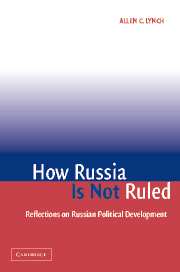Book contents
- Frontmatter
- Contents
- Acknowledgments
- Introduction
- 1 Historical Patterns of Russian Political Development
- 2 Soviet Legacies for Post-Soviet Russia
- 3 The 1990‘s in Russia: A New Time of Troubles?
- 4 Russia's “Neopatrimonial” Political System, 1992–2004
- 5 The Russian 1990s in Comparative Perspective
- 6 What Future for Russia? Liberal Economics and Illiberal Geography
- Conclusions
- Select Bibliography
- Index
2 - Soviet Legacies for Post-Soviet Russia
Published online by Cambridge University Press: 14 January 2010
- Frontmatter
- Contents
- Acknowledgments
- Introduction
- 1 Historical Patterns of Russian Political Development
- 2 Soviet Legacies for Post-Soviet Russia
- 3 The 1990‘s in Russia: A New Time of Troubles?
- 4 Russia's “Neopatrimonial” Political System, 1992–2004
- 5 The Russian 1990s in Comparative Perspective
- 6 What Future for Russia? Liberal Economics and Illiberal Geography
- Conclusions
- Select Bibliography
- Index
Summary
Since the Thirty Years' War, no people have been more profoundly injured and diminished than the Russian people by the successive waves of violence brought to them by this past brutal century.
– George KennanIntroduction
Karl Marx famously observed that while men make history, they do not usually do so in the manner that they intend. History itself, in the form of political, economic, social, cultural, and other historical influences or legacies, decisively shapes the range of public choice realistically available to leaders and societies. To what extent and how has Russia's distinctive historical experience in the Soviet period – which lasted for three-fourths of the twentieth century (compared to twelve years for Nazi Germany) – shaped the country's postcommunist circumstances and possibilities?
The Soviet Union that emerged from the Russian Revolution developed a patrimonial society that was both more comprehensive and more intensive than that of Tsarist Russia at least since the freeing of the gentry from obligatory service to the crown under Catherine the Great. The fusion of de facto sovereign power in the form of the communists' monopoly of political power with the communist state's monopoly of virtually all forms of capital in the state-owned economy both reflected and propelled a level of international hostility that served to justify the Soviet patrimonial party-state system itself.
- Type
- Chapter
- Information
- How Russia Is Not RuledReflections on Russian Political Development, pp. 47 - 84Publisher: Cambridge University PressPrint publication year: 2005

